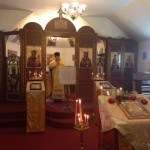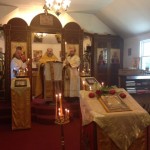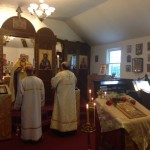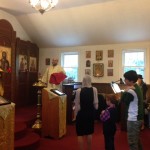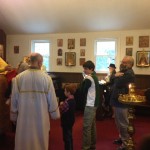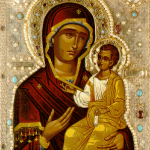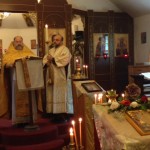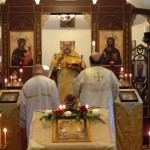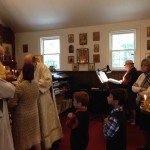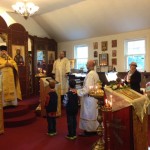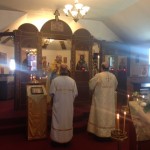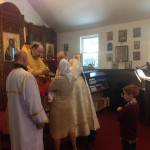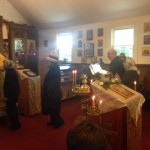On October 26, on the 20th Sunday after Pentecost, our Parish had a nice liturgical celebration. Our Rector, Archpriest Igor Tarasov served the Divine Liturgy. Following the Scripture readings he preached the following homily:
“Today, in addition to the Sunday celebration, we honor the Holy Fathers of the 7th Ecumenical Council. This was the last Council known as Ecumenical which means that this was the gathering representing the whole Universal, Ecumenical Orthodox Church. It defined our faith in veneration of the holy icons. This last Council proclaimed that the images of Christ, of the Most Holy Mother of God, and of the Saints have to be venerated among Orthodox Christians. We do not worship the icons because only God can be worshipped, but we do venerate the images of God incarnate and His Saints.”
“Another feast that we celebrate today is directly related to the veneration of the holy images. Today the Church has a minor feast in honor of the icon of the Most Holy Mother of God, the Icon of Our Lady of Iveron. As many other imagеs of the Theotokos, this icon became miraculous. And thus it confirmed the faith proclaimed by the Holy Fathers of the 7th Council. It manifested that the icons are very important and helpful in the life of the Orthodox people. Today’s celebrated icon was known to be saved from the unfaithful persecutors by some woman, a widow in Nicaea, the same city were later the 7th Council took place. That woman placed the icon upon the waves of the sea. We know that most of the icons are written upon the wood. So, that woman decided to rely on the mercy of God and on the power of the Theotokos to preserve the icon. So, the icon was thrown into the sea. Later it found its way to Mount Athos, a holy place where many Orthodox monks are living in endeavors of ascetic life. The icon was discovered in the water because the monks saw the pillar of light shining upon that place in the waters. This ocon became miraculous on Mt. Athos and it was kept in the Monastery called Iveron.”
“In the 17th century a copy of that icon was requested by the Orthodox Christians of Moscow. It had been made and brought to Moscow at the time of Patriarch Nicon and the Czar Alexey Mikhailovich. The icon showed a number of miracles for the city of Moscow. Thus it very revered in that city and in the whole Russian Church.”
“Today’s first Gospel reading tells us a very famous parable of the sower who went out to sow his seed. We all understand that the sower is a preacher of the Word of God, a missionary who is spreading the good news of the Christian faith. The sower should also be understood as our Lord Jesus Christ Himself. He came to sow the seed of His teaching and His salutary faith. The parable is telling us about different kinds of soil where the seed falls. Those kinds of soil are different kinds of people’s souls receiving the preaching of the Word of God.”
“Our Lord Jesus Christ explained the parable Himself, and we heard that interpretation. We have to admit that there is nothing we can add to His interpretation of His own parable. All the attempts to add or complete our Lord’s interpretation would be just paraphrasing what He Himself said. This is why today we should reflect about possible examples of the souls receiving the Word of God, examples of the soil taking in the seed from the divine Sower.”
”The seed on the wayside can be compared to the people who occasionally hear the preaching of the Gospel, are generally familiar with Christian faith. But somehow that word does not get to their souls. Jesus says that the devil takes away the word out of their hearts. There are many people in such a position in today’s world. We may see them even coming to the church to baptize the kids or to get married. They listen to you, but they do not really get the message.”
”The seed on the rock are the people who had no chance to know about true religion before, but one day they found it. They convert, become very interested in their faith. Jesus says that they receive the word with joy. Yes, they are happy and excited and they often become more zealous and pious than those who were born and raised in that faith. But the danger is that they have no root, as Jesus points it out. Not all of them will stay in the faith. Any temptation, any problem, any misunderstanding may turn them away from their acquired religion.”
“The seed fallen among the thorns are many regular people who may know their faith, who often consider themselves practicing believers and members of the Church. However, they are too much preoccupied with their earthly lives. They care too much about earthly achievements, material possessions, carriers, jobs, pleasures of life. This always leads to the neglect of what is spiritual and everlasting. Riches and pleasures, but sometimes just everyday cares and problems are choking the seeds of faith in their hearts just as the thorns choke the seeds of some plant. These people never have time for God, for a prayer or for the attendance of the church. Or if they do “squeeze” God into their busy schedule, they are not able to receive His grace or appreciate the richness of His teaching. Their faith becomes formal and official, but not deep and real. So they “bring no fruit to maturity”, as Jesus says.”
“Finally, our Lord says that the “good ground” are those who “keep the word and bear fruit with patience”. The key words here are to keep the word and to be patient. Keeping means preserving true faith, holy rites and customs, salutary traditions of the Church. It means not changing or altering them. And being patient means to endure in that religious life, to persevere in the works of faith and piety. Only people who do that may truly receive the Word of God, keep it and grow the seeds of divine teaching and then bear abundant fruits of faith, virtue and holiness.”
After the dismissal of the Liturgy the Rector said a brief sermon explaining today’s feast in the Russian language. It was especially interesting because among our parishioners we have a big family from Moscow and a family from Georgia as well. At both those places Orthodox Christians love and honor the holy Icon of Our Lady of Iveron.

